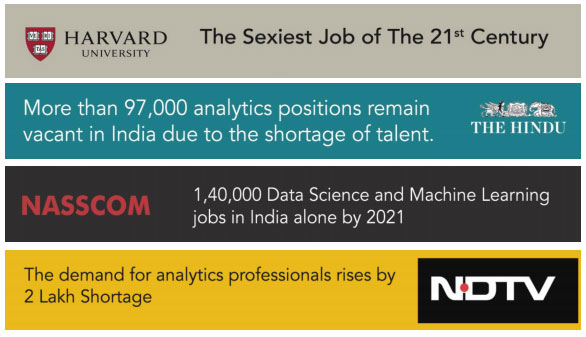
Data Science certification course is an extremely popular, in-demand profession which
requires a professional to possess sound knowledge of analysing data in all dimensions
and uncover the unseen truth coupled with logic and domain knowledge to impact the topline (increase business) and bottom-line (increase revenue). Also, Google Trends shows an
upward trajectory with an exponential increase in the volume of searches like never seen
before. This is proof enough to back the statements made by Harvard Business Review and
the business research giants, that Business Analytics will be the most sought-after
profession the world has ever witnessed.
Data Science / Analytics is creating myriad jobs in all the domains across the globe.
Business organizations realised the value of analysing historical data in order to make
informed decisions and improve their businesses.
Data Science has gained a cult status
amongst working professionals and grad students alike

"Steinbeis University, Berlin Accreditation, It is continuing faithfulness in the founding and development of this institution and outstanding competence, and excellence in deliveries".
Steinbeis University Berlin works as a knowledge and technology transfer partner to companies in trade and industry. Its core services encompass: research and development, consulting, and – as a basis for all of this – education. Founded in 1998, the Steinbeis University Berlin (German abbreviation: SHB) offers executive degrees and employee training and development programs matched to the needs
of ‘knowledge and technology transfer’ – that is ideally suited to the requirements of modern, knowledgebased society.
Steinbeis University aims to increase competitiveness among the students and the companies beyond the pure knowledge transfer and application.
Steinbeis accreditation recognizes ExcelR’s excellence in areas such as curriculum, faculty qualifications, support services, institutional effectiveness, planning and learning resources and student learning outcomes.
ExcelR’s Diploma In Data Science
ExcelR’s Diploma Program in Data Science curriculum is meticulously designed and delivered matching the industry needs and considered to be the best in the industry.
All our trainers have extensive experience as Data Scientists in leading Multinational companies and have passion for teaching and considered to be the best in the industry. At ExceIR, we hand pick the trainers subsequent to a thorough evaluation of knowledge, presentation skills, experience and passion for training. No wonder that our trainers are the best in the industry. Participants can be rest assured about the real-life practical exposure along-side with the theory.
PRE-REQUISITES
Graduates from any stream with good logical, mathematical and analogical skills. Working Professional from any domain, who has good logical, mathematical and analytical skills
AGENDA
Introduction to core python Programming
- Overview of Python-Starting with Python
- Why Python for data science?
- Anaconda vs. python
- Introduction to installation of Python and Packages
- Introduction to Python Editors & IDE's(Jupyter,/Ipython)
- Understand Jupyter notebook & Customize Settings
- Data Types & Data objects/structures (strings, Tuples, Lists, Dictionaries)
- List and Dictionary Comprehensions
- Debugging & Code profiling
- Built-in Functions (Text, numeric, date, utility functions) User defined functions – Lambda functions
Data science Project Lifecycle
- Introduction to Types of analytics
- project life cycle
- Introduction to R Programming
- Overview of R - Starting with R
- Installation R and R studio
- Data Types & Data structures
- Data Importing and Exporting
Basic Statistics
- Data Types, Measure Of central tendency, Sampling Funnel
- Python DS libraries Pandas, Numpy, Scikit, matplotlib);
- Measures of Dispersion, Expected Value
- R coding; Random Variable, Probability, Probability Distribution (Normal and Logistic)
- Graphical Techniques (Bar, Boxplot and histogram etc)
- Skewness & Kurtosis
- Sampling Variation
Interferential Statistics
- CLT, Confidence interval
- R coding; Introduction to concept with examples( 2 proportion test, 2 t sample t test)
- Python DS coding concepts and challenge
- Anova and Chisquare case studies
Linear Regression
- Scatter Diagram, Corr Analysis, Priciples of Regression
- Python DS coding challenges
- Intro to Simple Linear Regression
- Python DS coding challenges
- Multiple Linear Regression
Data Mining – Unsupervised
- Clustering – Hierarchical
- Python DS coding challenges
- Clustering – Kmeans
- Unsupervised - Network Analytics(update the code in better way)
- Python DS coding challenges
- Association Rules
- Python DS coding challenges
- Recomender System
Dimension Reduction
- PCA
Text Mining
- Introduction to Text Mining and applications Python DS coding challenges
- Vector Space Method (VSM)[Text processing, TDM and Weights]
- Python DS coding challenges
- Word clouds and LDA
- Python DS coding challenges
- Latent Semantic Analysis (LSA)
- NLP introduction, NER and Emotion mining
Chatbot
- Chatbot introduction, types bots and demo
Algorithms
- Naïve Bayes
- KNN
- Decision Tree
- Random Forest
- Bagging, boosting and stocking
- XGBM
- LGBM
- SVM
Regularization
- Lasso and Ridge Regressions
Forecasting
- Introduction to Timeseries, Level, Trend and Seasonality, strategy (Python DS coding challenges)
- Scatter plot, Lag plot, ACF, Principles of Visualization, Naïve forecasts (Introduction to R shiny (deployment))
- Forecast in Error and it metrics, Model Based Approaches (Introduction to Python flask (deployment))
- Model Based approach cont,
- AR Model for errors Data driven approaches, MA and exp Smoothing
Survival Analysis
- Concept with a business case
Duration 40 Hours
